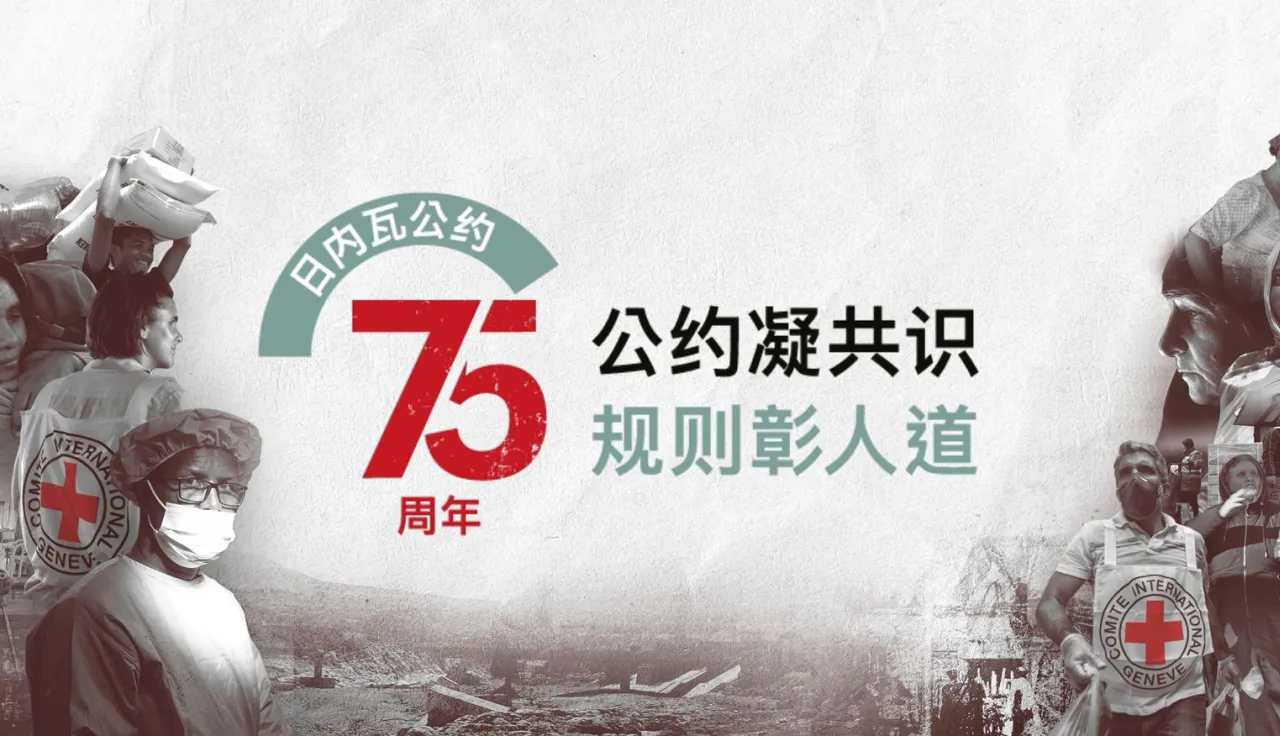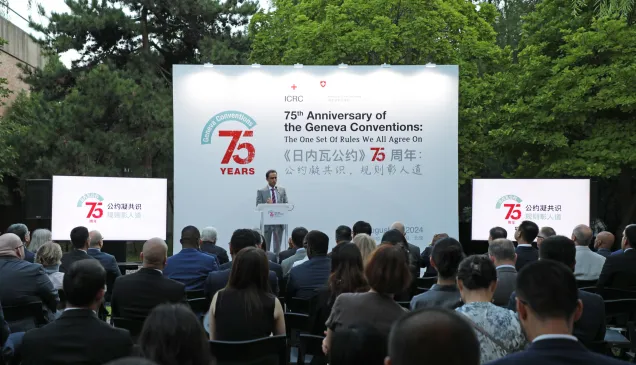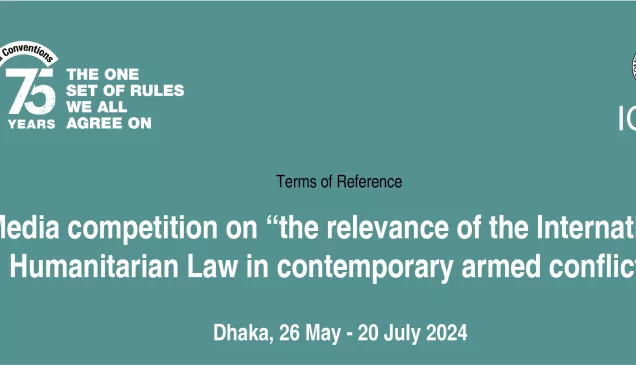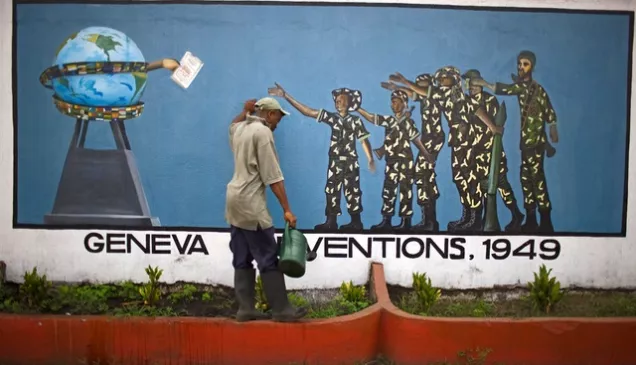Geneva Conventions: humanity must prevail!

Today marks the 75th anniversary of the four Geneva Conventions adopted on 12 August 1949. Ordinarily this would be a cause for celebration, but it is difficult to rejoice when there are more than 120 ongoing armed conflicts at present with catastrophic humanitarian consequences. We must reflect not only on the past 75 years of the Conventions but also ask ourselves how we, humankind, envision the next 75 years and how we can preserve the hard-earned gains that were only made possible because of our belief in our shared humanity that led to the adoption of the four Geneva Conventions of 1949.
Today marks the 75th anniversary of the four Geneva Conventions adopted on 12 August 1949. Ordinarily this would be a cause for celebration, but it is difficult to rejoice when there are more than 120 ongoing armed conflicts at present with catastrophic humanitarian consequences. We must reflect not only on the past 75 years of the Conventions but also ask ourselves how we, humankind, envision the next 75 years and how we can preserve the hard-earned gains that were only made possible because of our belief in our shared humanity that led to the adoption of the four Geneva Conventions of 1949.
Laws and customs of war predated modern international humanitarian law (IHL) and originated hundreds of years ago from the rich cultural and spiritual practices found in Asia, the Pacific, Middle East, Africa, the Americas and Europe. The four Geneva Conventions of 1949 and their additional protocols are the backbone of modern IHL, and a codification of some of those rich customs and practices from around the world. IHL as a comprehensive body of law that encompasses many international treaties, including the four Geneva Conventions of 1949 and includes customary law, regulates the means and methods of warfare, and seeks to minimize human suffering during armed conflict. Each of the four Geneva Conventions protects a special category of people who are not or no longer participating in hostilities. The first Geneva Convention protects wounded and sick soldiers on the battlefield, while the second Geneva Convention protects the wounded, sick and shipwrecked of the armed forces at sea. The third Geneva Convention protects prisoners of war, and the fourth Geneva Convention protects civilians.
Although today marks the 75th anniversary of the four Geneva Conventions, this year also marks the 160th anniversary of the First Geneva Convention, a treaty that was adopted by only a few States at the time. However, the importance of the protections afforded by the treaty was later realized by all States which not only contributed to its expansion but also resulted in its universalization in 1949. The four Geneva Conventions of 1949, which are universally ratified, embody a common language, common values and a global consensus that even in the darkest moments in history, humankind must continue to preserve a degree of humanity. However, today, humanity is confronted with a frightening reality of non-compliance with IHL.
Modern armed conflicts have become ever more dangerous since the dawn of the 20th century. Some of the concerning features of modern warfare include: the rapid development of new and deadly weapon technologies, the urbanization of warfare as conflicts shift from open fields to densely populated cities, the frequent use of heavy weapons with wide area impact, the deliberate dehumanization of the enemy through labels such as ‘terrorist’. All these factors, amongst others, result in armed conflicts that are more lethal, less humane, with devastating humanitarian consequences and alarming risk of IHL violations. This cannot be the status quo.
The shared values of humanity must not be undermined by political polarization. States should not fall in the trap of exceptionalism. There is no elasticity in humanitarian obligations. The destruction of schools, hospitals, and essential infrastructure should not be normalized as inevitable part of conflict. The killing of humanitarian workers should not become an expected part of conflict. Violations of IHL must not become the new normal. The rules of war are not optional. When the earth is scorched without distinction and IHL violations are committed with impunity, this fuels further cycles of violence often resulting in protracted armed conflicts that span decades. On the other hand, when IHL is respected, parties to the conflict retain a glimmer of hope that could lead them back to peace.
International Humanitarian Law has the power to change behavior on the battlefield. The world has no stronger tool at its disposal to use in times of war to protect civilians. As such, States must do all that is necessary to build a culture of respect for IHL, which can be exemplified by three fundamental pillars: ratification of IHL treaties, implementation of IHL in domestic law, and the dissemination of IHL amongst armed forces, and civilians, including policy makers. These pillars combined, create a culture of respect for IHL that positively influences behavior on the battlefield during an armed conflict.
International humanitarian law includes many international treaties that have saved countless lives. Treaties that prohibit and limit the use of weapons have prevented the indiscriminate killing and maiming of civilians. Treaties like Anti-Personnel Mine Ban Convention, the Convention on Cluster Munitions and the Chemical Weapons Convention have significantly reduced the number of casualties resulting from these weapons. Weapon treaties are a step towards peace; reducing the number of deadly weapons around the world can make the world a safer place. Weapons that cause superfluous injuries and cause unnecessary suffering are prohibited under IHL. These very weapons often cause scars much deeper than physical injuries, which are carried by generations that can become a barrier to peace, security and stability. Strengthening ratification of IHL treaties is one of the loudest forms of support and commitment for IHL.
In addition, implementation of IHL into domestic law, military manuals, doctrines and decrees is the surest way to prevent IHL violations. Implementation of IHL is too often uneven, but when parties do respect the law, lives are saved. These moments are less visible or newsworthy. Harm that never occurs is difficult to quantify and it is difficult to report on violations that did not happen: when hospitals are not bombed, people are not killed, and vital infrastructure is spared. Yet these moments serve as powerful reminders that the law does act as a brake on behavior in war. For this reason, implementation is crucial in creating a culture of respect for IHL.
Equally important is the prosecution of violations of IHL. Parties to the conflict must not endorse a culture of impunity. The efforts and support spent justifying atrocities should instead be dedicated to holding those committing the atrocities responsible. The criminal repression of grave violations of IHL is an obligation on all State parties to the four Geneva Conventions of 1949.
The devastating aftermath of WWII triggered a stark universal recognition that wars needed rules to limit their horrific effects on populations. There was a consensus that ‘never again’ should such horrors be repeated. China was among the first countries which recognized the Geneva Conventions on 13th July 1952. The then premier Chou Enlai, in his letter to the Swiss Federal Council highlighted that the People’s Republic of China was recognizing these conventions because they are ‘conducive to a lasting peace among all nations’, an important message that must be reiterated and remembered at all times.
In September 2023, during his meeting with ICRC president, Mirjana Spoljaric, President Xi Jinping emphasized that humanitarianism is the greatest consensus that can unite different civilizations. The four Geneva Conventions and the underpinning principle of humanity is the manifestation of this consensus that we all need to remind ourselves of again.
ICRC is the guardian of IHL, but we cannot enforce IHL on unwilling States. The world is in urgent need of powerful voices advocating for respect for IHL. In the words of the ICRC President, States must make IHL a political priority. The ICRC reaffirms its readiness to support States on this journey of promoting compliance and respect for IHL, as preserving humanity is a crucial call on all of us.



